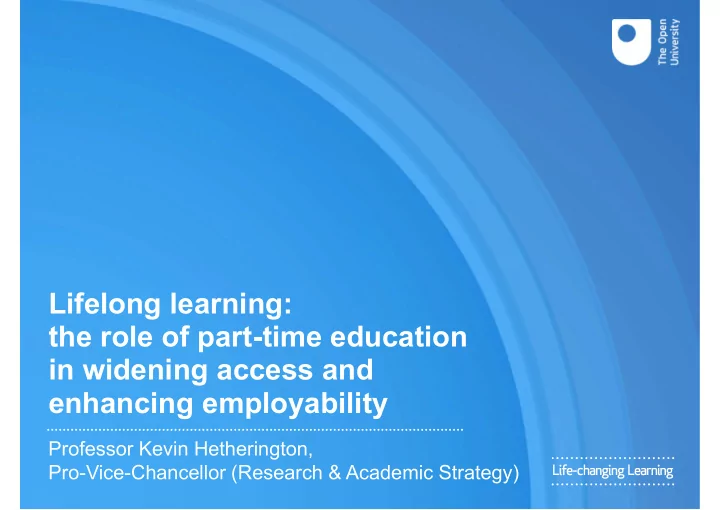

Lifelong learning: the role of part-time education in widening access and enhancing employability Professor Kevin Hetherington, Pro-Vice-Chancellor (Research & Academic Strategy)
The Open University profile Open to people, places, methods and ideas ● UK’s largest University – 175k studying in 2015/16 ● Taught students throughout the UK, Europe and across the World ● 2 million students since 1969 ● 15,000 degrees awarded in 2015/16 ● 38% of the UK’s part time students ● 4,000 academic, research and support staff and research students ● 5,000 Associate Lecturers providing tuition, assessment and support ● Supports UK government agenda – lifelong learning; degree-level apprenticeships; widening participation; social mobility ● Strategic vision: “ to reach more students with life-changing learning that meets their needs and enriches society ” 2
3
OU learning The learning model ● Blended learning – online interactive and printed materials; online and face-to-face tutorials; on-line forums and residential and day schools ● Flexible study patterns – designed to work around student needs e.g. study breaks ● Flexible assessment – online tests, examinations and projects Widening access ● Open entry for most undergraduate qualifications ● Direct support through ‘Access’ courses ● Adjustments and support for disabled students ● Current work to reduce the black and minority ethnic attainment gap Student Support ● Dedicated student support teams and lecturers providing interactive support ● Learning analytics systems help identify and support students with proactive interventions Quality ● External quality assessment against same requirements as campus based UK universities – UK Quality Code 4
Enhancing employability “A set of capabilities and achievements that support students in developing their careers, raising their aspirations and enhancing their contribution to society.” (OU definition) ● 85% of alumni said studying with us helped them achieve their career goals ● “Earning and learning” – 76% of OU students work full or part-time ● 88 of the FTSE 100 companies have sponsored staff on OU modules Employment-focused curriculum: ● Work-based learning programmes, e.g. Nursing, Social Work and Apprenticeships ● Career-oriented programmes, e.g. MBA ● Continuing professional development and career-focused MOOCs Employability policy for all curriculum: ● Employability skills feature in intended learning outcomes of every course ● Skills development through learning design – a “Levels” framework ● Careers service and personal development planning tools ● Engagement with employers to inform curriculum planning and development 5
CBI Core employability skills The 7 skills are built into the OU’s Curriculum 1. Self management 2. Team working 3. Problem solving 4. Communication and literacy 5. Numeracy 6. Application of information technology 7. Business and customer awareness (The Confederation of British Industry, 2011 Building for Growth report) ● OU embeds these employability skills in all undergraduate and postgraduate courses ● Particular focus on digital and information literacy skills development 6
Benefits of part-time and distance learning at the OU ● Earning and learning can have a positive impact on the workplace from the start ● Distance learning widens access and enhances employability ● Providing opportunities for those otherwise disadvantaged by background, financial circumstances, disability, caring responsibilities ● Cost effective option compared to campus-based universities ● Innovative use of technologies to support flexible, mobile, engaging learning ● Bite-size professional development through open educational resources and MOOCs ● Collaboration with employers to provide a combination of academic learning at a distance and employment-based learning locally e.g. for apprenticeships ● Supporting life-long learning and career development through recognition of prior learning ● Part-time and distance education is a catalyst for social mobility 7
What’s stopping you?
Recommend
More recommend